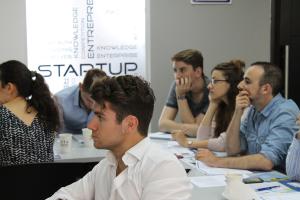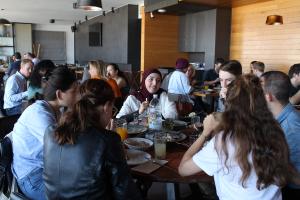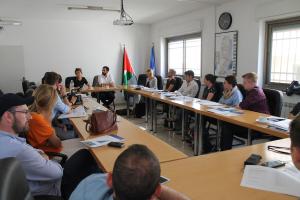KAS-ELES dialogue program - Foundation Office Palestinian Territories
The Konrad-Adenauer-Stiftung (KAS) was pleased to host a group of German KAS and Ernst Ludwig Ehrlich Studienwerk (ELES) scholarship holders in the city of Ramallah to offer them a closer look into the Palestinian society and meet experts to learn more about local politics, economy, social entrepreneurship and everyday life.
KAS’ Resident Representative in Ramallah Marc Frings welcomed the delegation in Jerusalem and delivered a briefing with a focus on domestic challenges, international fragmentation trends and the responsibility of the international community. The 21 scholarship holders who come from German and international universities were introduced throughout the day to the Palestinian ecosystem, life in East Jerusalem, the reality of the energy and water sectors and culture.
In a presentation given by the Ibtikar Fund, Co-founder Ambar Amleh and CFO, Reem Qawasmi, introduced the Palestinian ecosystem and startup scene. Amleh and Qawasmi explained the different layers of Palestinian economy and how it is shaped by the many factors, including the Israeli occupation, internal politics and limited access to vital resources and funds. Qawasmi said that the Palestinian youth found opportunity in the high unemployment rates and began to think of new ways to create jobs and develop their community. Both speakers shared success stories of Palestinians who succeeded in creating companies that currently operate across the region.
The session was held at Leaders organization, a non-profit dedicated to the development of Palestine through two initiatives; digital entrepreneurship and Socioeconomics. This was another opportunity for the delegation to witness a real setting where Palestinian youth gather on daily basis to think creatively and inspire each other.
In an attempt to offer the delegation a better understanding of Palestinians’ reality in East Jerusalem, KAS invited Moein Odeh, an East Jerusalem attorney and legal researcher. Odeh explained how the separation wall continues to affect the lives of hundreds of thousands of Palestinians from East Jerusalem and how little is being done to ensure a better quality of life for those individuals. The delegation was highly interested in Odeh’s presentation and challenged him with a wide array of legal, economic, political and social questions, paving the way for a lively debate.
Described by the KAS and ELES delegation as the highlight of the event, KAS invited five Palestinian youth who work in different fields including, business, environment, social entrepreneurship and crowdfunding to share lunch with the German youth. The speakers introduced themselves and were grouped with the scholarship holders of similar interests. The German youth were able to ask the Palestinian speakers many questions, mostly about their lives and work, but also about the political scene and their expectations and ambitions. Following the meeting, both the Palestinian and German youth expressed their appreciation for this rare opportunity to meet and converse about all kinds of different topics with complete freedom and openness.
In the afternoon, the KAS team welcomed the delegation to its Ramallah office where the group met with Nada Majdalani, the Palestinian Director of EcoPeace. Majdalani briefed the delegation about the energy and water reality in Palestine and the complex issues surrounding these two major issues. She said it is of utmost importance to improve the situation and come up with fast solutions to help Palestinians lead normal lives. She called on everyone to consider the serious consequences of energy and water crisis on Palestinians in the Gaza Strip and the West Bank and that such a solution requires international cooperation and willpower.
The group finally met with Palestinian Minister of Culture, Ehab Bessaiso, who gave a short presentation about different topics including culture and later opened the floor for questions. The minister was impressed with the diversity of the questions and also the openness of the group to discuss very sensitive issues. The meeting was held at the Yasser Arafat Museum in Ramallah and was followed with a dinner and evaluation session.





